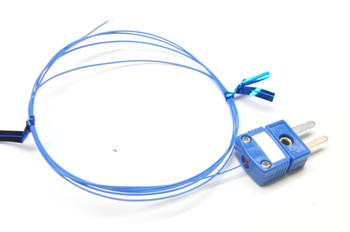MN Measurement Instruments™
Ultra Thin K-type Thermocouple AWG36 3ft
- SKU:
- K-AWG36-3ft
- UPC:
- 740223637484
- MPN:
- K-AWG36-3ft
- Availability:
- in stock
- Weight:
- 0.10 LBS
- Shipping:
- Calculated at Checkout
Description
Ultra Thin K-Type Thermocouple AWG36 for Digital Thermometer
- 1 thermocouple 0.027 inch or 0.7 mm diameter with Teflon PFA insulation -
-320 to 500°F (-200 to 260°C)
This is a flexible K-type Thermocouple for use in a wide range of medium temperature applications, such as environmental monitoring, ovens, wood kilns, laboratory and science use. K-type thermocouples are also used in low and ultra low temperature application and cryogenics. The probe is made from AWG 36 Gauge K-type thermocouple wire and is rated for continuous use at from -320 °F up to 500 °F Fahrenheit (or -200 °C to 260 °C) . The K-type thermocouple is about 0.7 mm or 0.027 inch in insulation diameter. This type K Thermocouple Probe is made with a miniature K-type Thermocouple plug and will fit most digital K-type Thermometers. The thermocouple plug contacts are made from Chromel/Alumel compensation metal for highest accuracy measurements.
The photos show a 0.5 mm pencil for comparison.
This is made to order and may need 2 to 3 days production time
Specification:
Thermocouple: K-Type
Thermocouple Grade: Class 1 (Select Grade) +/- 1.5 °C
Temperature Range: Continuous use up to 500 °F or 260 °C
ANSI color coded PFA insulation, red = -, yellow = +, outside yellow
Wire length: approx. 3 ft / 95 cm
Wire thickness: AWG36 (0.125 mm) diameter
Probe thickness with insulation: 0.027 inch (0.7 mm)
Miniature K-Type connector
1 Review
-
Uninstrusive and robust thermocouple
The ultra-thin nature minimizes 'observer effects', while the PFA insulation survives nicely at relatively high temperatures.

















